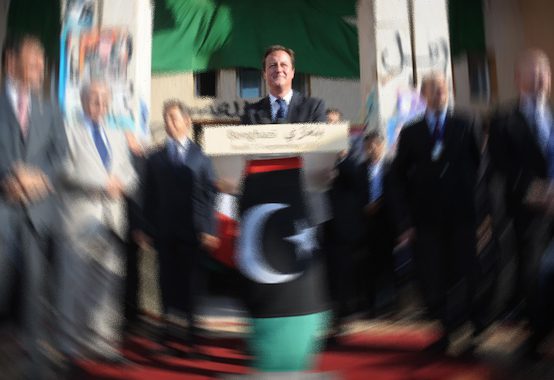Cameron and the Effects of the Libyan War

Fraser Nelson challenges David Cameron’s self-serving rhetoric on the Libyan war:
‘Were we right to stop a massacre? Yes, we absolutely were,’ said David Cameron on his Radio 4 Today programme interview. But the real question is different: were we right to depose Gaddafi, given the chaos (and bloodshed) that has followed in Libya?
The difference between these two questions reflects the gap between the two sides in debates over “humanitarian” intervention. The interventionist assumes that his stated good intentions are what matter most, while those on the other side judge the policy by its likely consequences and actual results. Cameron asserts that there was certain to be a massacre and that the intervention prevented it. This is a dubious assertion, but it can’t be disproven. Cameron is going to frame the war in this way because it avoids addressing the war’s destabilizing and harmful effects, many of which opponents of the war expected and cited as reasons not to intervene. Cameron naturally doesn’t want to be judged on the effects of the war he championed, but only wants people to remember that he meant well.
Those two questions are closely related. It was practically guaranteed and entirely foreseeable that the intervention in Libya would not remain limited to protecting an enclave in eastern Libya against Gaddafi’s forces.The impetus for intervening in the first place was always to take sides in the civil war against the government, and once the U.S. and its allies took that side they were always very likely to press on until “their side” prevailed. If one favored “doing something” militarily to oppose the Libyan government, one favored going to war with the Libyan government until it was defeated, and in that case the government’s defeat was going to be its overthrow. Though the Obama administration and other intervening governments pretended for the sake of appearances that regime change was not the goal of the mission, it was clear very early on that toppling the Libyan government was bound to be what the intervening governments would define as “success” once they had tied themselves to the rebels’ cause. After the fact, Libyan war supporters crowed that the intervention had “worked” because it had toppled the Libyan government, which they had previously claimed was exactly not what the intervention was designed to achieve.
The Libyan case is a good recent example of how military interventions that are sold as “limited” and defensive in nature at the beginning can easily morph into a much more ambitious and aggressive policy. Sometimes this escalation may be the intention of the intervening governments all along, and sometimes it will result from political pressure from hawks back home that make demands to “do more” or “finish the job.” Regardless, once a government has crossed the line and initiated hostilities it is almost impossible politically for them to pull back and halt an intervention, and a government that is inclined to start an unnecessary war is also unlikely to see the virtue in stopping it.
Comments